Peter MALONE
Saturday, 18 September 2021 19:27
Andibachtiar, Yusuf/ Indonesia. 26th January 2009
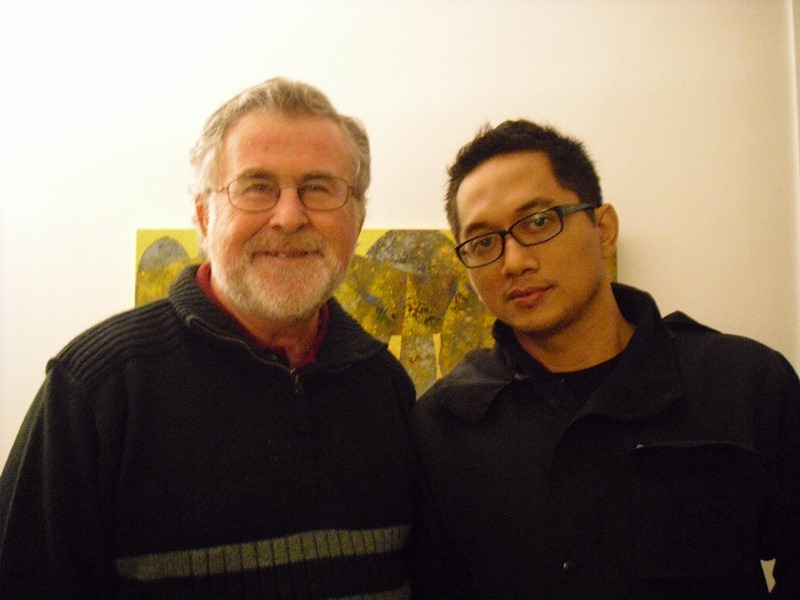
Published in Movie Reviews
Published in
Movie Reviews
Tagged under
Saturday, 18 September 2021 19:27
Anais Barbeau- Lavalette. Kiev, October 2008.

Published in Movie Reviews
Published in
Movie Reviews
Tagged under
Saturday, 18 September 2021 19:27
Alessandro D,Alatri. Venice, 3rd September, 2008

Published in Movie Reviews
Published in
Movie Reviews
Tagged under
Saturday, 18 September 2021 19:27
Alexsander Sukurov. With SIGNIS Jury, September 2007.
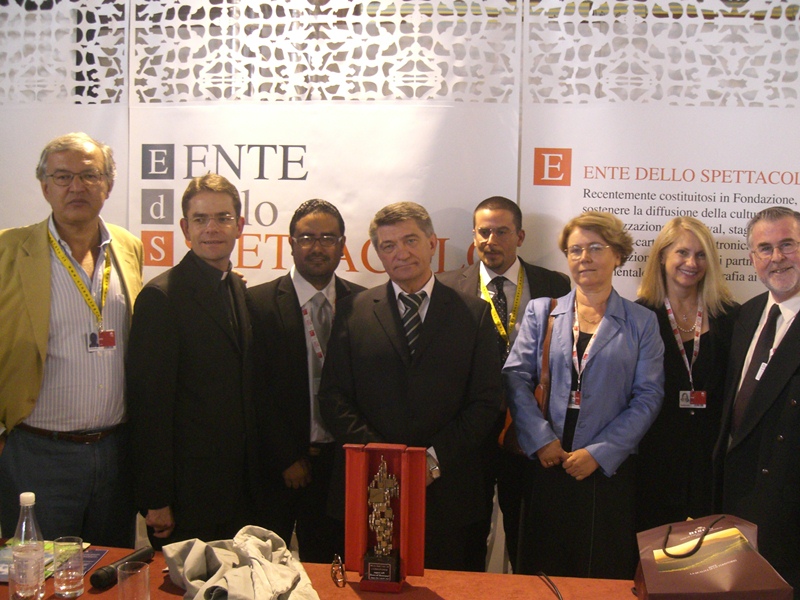
Published in Movie Reviews
Published in
Movie Reviews
Tagged under
Saturday, 18 September 2021 19:27
Agnieszka Holland. Tehran, February 2007
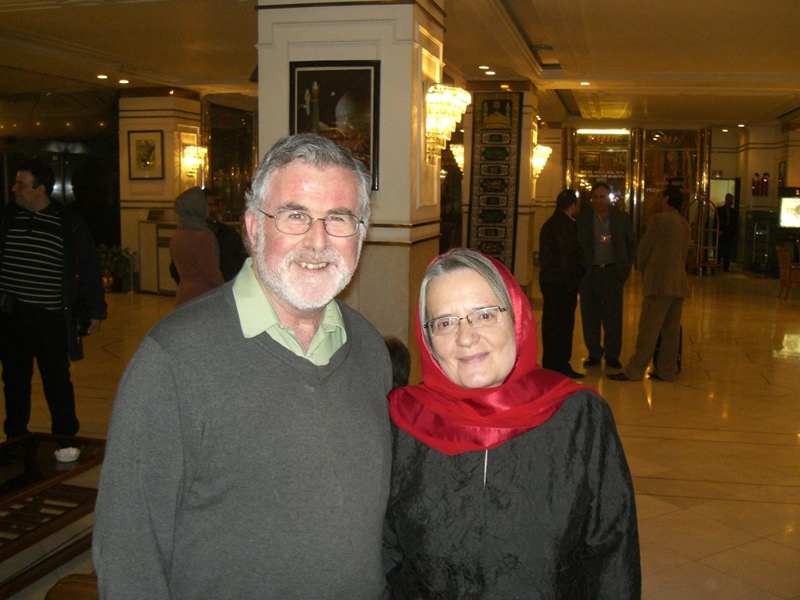
Published in Movie Reviews
Published in
Movie Reviews
Tagged under
Saturday, 18 September 2021 19:27
DIRECTOR GALLERY
DIRECTOR GALLERY
This section is something of a vanity of vanities project. Having interviewed directors in the past but forgotten to ask for their autographs, I decided in recent years to ask for photos instead. Here they are with the places where the photos were taken and the dates.
Agnieszka Holland. Tehran, February 2007
Alessandro D'Alatri/ Italy. Venice, 3rd September 2008
Alexsander Sukurov. With SIGNIS Jury, September 2007.
Andibachtiar, Yusuf/ Indonesia. 26th January 2009
Andreas Amstedt/ Holland. Dhaka, 16th January 2010
Andreas Fesoes/ Hungary. Kiev, 26th October 2008
Andrei Zviagintsev/ Russia. Yerevan, July 2007
Andrew Lang/ UK. Havana, 12th December 2009
Anwar Jamahl/ India. Dhaka, 23rd January 2010
Atom Egoyan/ Canada. Cannes, 24th May 2008
Babek Payami/ Iran, Switzerland. Venice, 9th September 2009
Barbara Albert/ Austria. Berlin, February 2007
Ben Hopkins/ UK. Washington DC, 20th April 2009
Bernard Ermond/ Canada, right. Locarno, July 2005, with the Ecumenical Jury
Bob Hercules/ US. Dhaka, 22nd January 2010
Boris Despodov/ Serbia. Berlin, February 2008
Brillante Mendoza/ Philippines. Berlin, February 2008
Bruno Dumont. France. Yerevan, July 2007
Burhan Qrbani/ Germany, right, and cast. Berlin 20th February 2010
Carla Garapadian/ UK. With Hans Hodel/ Interfilm. Yerevan, July 2007
Catalan Mitelescu/ Romania. Bucharest, November 2006
Catherine Hardwicke/ US. Los Angeles, October 2006
Chang dong-lee/ Korea. Yerevan, July 2007
Charles Robert Carner/ US. Los Angeles, October 2004
Cheikh Ndiaye/ Senegal. Zanzibar, June 2006
Claude Gagnon/ Canada, centre. Montreal, September 2005
Clementine Ederveen/ Holland. Dhaka, 21st January 2010
Damien Roussineau/ France. Kiev, October 2008
Daniel Burman/ Argentina. Venice, 2nd September 2008
Daniel Dencik/ Denmark. Oslo, 8th November 2009
Dariush Yari/ Iran. Dhaka, January 2006
Doy del Mondo/ Philippines. Manila, January 2007, with Terry Hermano
Dominque Abel and Fiona Gordon/ Belgium. Kiev, October 2008
Edgardo Cabeza/ Argentina. Buenos Aires, 15th April 2008
Eduardo Continho/ Argentina. Buenos Aires, 8th April 2008, centre, with Gustavo Andujar
Elizabeth Bostan/ Romania. Bucharest, November 2005
Enamul Karin Nirjah/ India. Dhaka, 16th January 2010
Erik Poppe/ Norway. Oslo, 7th November 2009
Eugen Schiller/ Australia. Melbourne, 1st January 2009
Ferid Boughedir/ Tunisia. Cannes, 24th May 2008
Gaston Biraben/ Argentina. Turnhout, April 2005
Hana Makhmalbaf/ Iran, France. 26th October 2008
Hannah Schygulla/ Germany. 9th December 2009
Jafar Panahi/ Iran. Kiev, July 2007
Majid Majidi/ Iran. Montreal, September 2001
Mario Monicelli/ Italy. Tehran, Feburary 2007
Michael Haneke/ Austria. Cannes, 24th May 2009
Morgan Spurlock/US. Los Angeles, October 2007
Paul Haggis/US. Santa Monica, October 2007.
Negar Azarbayjani/ Iran. Tehran, February 2011, right, with actress and Interfaith Jury
Rolf de Heer/ Australia. Venice, 1993, with the OCIC Jury
Scott Derickson/ US. Los Angeles, October 2005
Walter Salles/ Brazil. Venice, 4th September 2009
Wim Wenders/ Germany, US. Locarno, July 2005, with the Ecumenical Jury
Yilmaz Arslan/ Germany, centre with child actor. Locarno, July 2005, with the Ecumenical Jury
This section is something of a vanity of vanities project. Having interviewed directors in the past but forgotten to ask for their autographs, I decided in recent years to ask for photos instead. Here they are with the places where the photos were taken and the dates.
Agnieszka Holland. Tehran, February 2007
Alessandro D'Alatri/ Italy. Venice, 3rd September 2008
Alexsander Sukurov. With SIGNIS Jury, September 2007.
Andibachtiar, Yusuf/ Indonesia. 26th January 2009
Andreas Amstedt/ Holland. Dhaka, 16th January 2010
Andreas Fesoes/ Hungary. Kiev, 26th October 2008
Andrei Zviagintsev/ Russia. Yerevan, July 2007
Andrew Lang/ UK. Havana, 12th December 2009
Anwar Jamahl/ India. Dhaka, 23rd January 2010
Atom Egoyan/ Canada. Cannes, 24th May 2008
Babek Payami/ Iran, Switzerland. Venice, 9th September 2009
Barbara Albert/ Austria. Berlin, February 2007
Ben Hopkins/ UK. Washington DC, 20th April 2009
Bernard Ermond/ Canada, right. Locarno, July 2005, with the Ecumenical Jury
Bob Hercules/ US. Dhaka, 22nd January 2010
Boris Despodov/ Serbia. Berlin, February 2008
Brillante Mendoza/ Philippines. Berlin, February 2008
Bruno Dumont. France. Yerevan, July 2007
Burhan Qrbani/ Germany, right, and cast. Berlin 20th February 2010
Carla Garapadian/ UK. With Hans Hodel/ Interfilm. Yerevan, July 2007
Catalan Mitelescu/ Romania. Bucharest, November 2006
Catherine Hardwicke/ US. Los Angeles, October 2006
Chang dong-lee/ Korea. Yerevan, July 2007
Charles Robert Carner/ US. Los Angeles, October 2004
Cheikh Ndiaye/ Senegal. Zanzibar, June 2006
Claude Gagnon/ Canada, centre. Montreal, September 2005
Clementine Ederveen/ Holland. Dhaka, 21st January 2010
Damien Roussineau/ France. Kiev, October 2008
Daniel Burman/ Argentina. Venice, 2nd September 2008
Daniel Dencik/ Denmark. Oslo, 8th November 2009
Dariush Yari/ Iran. Dhaka, January 2006
Doy del Mondo/ Philippines. Manila, January 2007, with Terry Hermano
Dominque Abel and Fiona Gordon/ Belgium. Kiev, October 2008
Edgardo Cabeza/ Argentina. Buenos Aires, 15th April 2008
Eduardo Continho/ Argentina. Buenos Aires, 8th April 2008, centre, with Gustavo Andujar
Elizabeth Bostan/ Romania. Bucharest, November 2005
Enamul Karin Nirjah/ India. Dhaka, 16th January 2010
Erik Poppe/ Norway. Oslo, 7th November 2009
Eugen Schiller/ Australia. Melbourne, 1st January 2009
Ferid Boughedir/ Tunisia. Cannes, 24th May 2008
Gaston Biraben/ Argentina. Turnhout, April 2005
Hana Makhmalbaf/ Iran, France. 26th October 2008
Hannah Schygulla/ Germany. 9th December 2009
Jafar Panahi/ Iran. Kiev, July 2007
Majid Majidi/ Iran. Montreal, September 2001
Mario Monicelli/ Italy. Tehran, Feburary 2007
Michael Haneke/ Austria. Cannes, 24th May 2009
Morgan Spurlock/US. Los Angeles, October 2007
Paul Haggis/US. Santa Monica, October 2007.
Negar Azarbayjani/ Iran. Tehran, February 2011, right, with actress and Interfaith Jury
Rolf de Heer/ Australia. Venice, 1993, with the OCIC Jury
Scott Derickson/ US. Los Angeles, October 2005
Walter Salles/ Brazil. Venice, 4th September 2009
Wim Wenders/ Germany, US. Locarno, July 2005, with the Ecumenical Jury
Yilmaz Arslan/ Germany, centre with child actor. Locarno, July 2005, with the Ecumenical Jury
Published in Movie Reviews
Published in
Movie Reviews
Tagged under
Saturday, 18 September 2021 19:27
* batteries not included
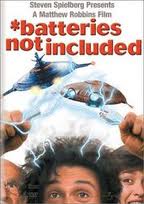
* batteries not included
US, 1987, 106 minutes, Colour.
Hume Cronyn, Jessica Tandy, Elizabeth Pena, Frank McRae?, Denis Boutsikaris.
Directed by Matthew Robbins.
- batteries not included is a Steven Spielberg production - something of a blend between Cocoon and Gremlins. The film was co-written and directed by Matthew Robbins (Corvette Summer, Dragonslayer). It focuses on developers in New York, a group of people holding out in an old apartment block - the pressures of the developers, especially using Hispanic thugs, their stances against the authorities. The film then becomes a fantasy with mechanical creatures coming from another planet, helping to restore everything that is broken, and helping the people retain their apartment block.
The stars are the veteran husband and wife team of Hume Cronyn and Jessica Tandy (who also appeared in Cocoon). There is a cross-section of American figures in the apartment. However, the scenes are soon stolen by the very small flying saucer-like creatures who come to help the people in their apartment block.
It is a bit difficult to decide who the film is designed for: perhaps grandparents with their grandchildren. Somewhat slow-moving but pleasant fantasy with a point about unscrupulous developers and people's rights to their home.
1. Entertaining fantasy? Social message?
2. The atmosphere of New York City, the slums and their demolition, new buildings? The feel for New York? The musical score by James Horner - and the use of big band, '40s-style music?
3. The visual effects and special effects, the creatures, their mechanical style, their 'human' qualities?
4. The credits and the collage of Frank and Faye, their marriage, Bobbie, in the neighbourhood, growing up, growing old?
5. The situation with Lacey and his henchmen, wanting the building demolished? Carlos and his friends and their violent pressure on the people in the building? Their terrorising each of the characters? Offering them money? Their refusal to go?
6. The building and its inhabitants, its ugliness, yet home? Frank and his worry about Faye and her not being in the present, wandering? The money offered? Sid and Muriel and their help, their decision to go to the old people's home? Faye and her absentmindedness, thinking of Bobbie? Frank and his work, anguish, the diner and the customers? His exasperated smashing of things?
7. Mason and his girlfriend, his art? The girl leaving? His throwing his art out the window?
8. Marissa and her pregnancy, waiting for Hector to come back, the friendship with Mason, getting his paintings, sharing the experience with him, falling in love?
9. Harry and his background as a prize-fighter? Quiet, not speaking, his mechanical genius? Fixing the little creature?
10. Faye and her charm with everybody, her memories, seeing Carlos as Bobbie? Frank and his humouring her? Her love for him? The arrival of the creatures, swooping around the house, fixing everything? The humans' reaction? Delight? Helping one another, the birth of the new creatures? Harry and his taking the green creature and fixing it? Their being dispersed, Harry with the whistle and his going to Times Square and reuniting the creatures?
11. Mason and his concern, help, with Marisa? His drinking, her saying goodbye to Hector?
12. Frank and Faye and the truth about Bobbie, Carlos coming into the diner? His reaction against being Bobbie? Yet his attraction towards the couple?
13. Carlos as villain, his plans, dressing up, going to Lacey, the arsonist, his clash with him, the heroic rescuing of Faye?
14. The burning building, the rescue, Harry sitting in the ruins? The hospital sequences? Carlos and the attempted reconciliation?
15. The creatures and their return, the rebuilding of the apartment block, better than ever, Lacey and his anger, sacking his henchmen? The new buildings with the old retained? A preserved building?
16. The themes of old people; home? Living in the present, living in the past, truth? Love?
Published in Movie Reviews
Published in
Movie Reviews
Tagged under
Saturday, 18 September 2021 19:27
Beast With Five Fingers, The
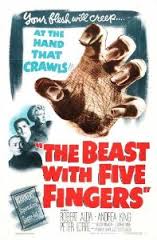
THE BEAST WITH FIVE FINGERS
US, 1946, 89 minutes, Black and white.
Peter Lorre, Andrea King, Robert Alda, J. Carroll Naish, Victor Francen, Charles Dingle.
Directed by Robert Florey.
The Beast With Five Fingers was a popular horror film of the 1940s. It capitalised on a grotesque story of a possessed hand. While the film initially built up atmosphere, especially with Peter Lorre, the film explains away too much at the end. Nevertheless, for the time that it is on the screen, it is an enjoyable example of high-handed horror.
1. The popularity of this kind of horror film? Nightmare? Violence?
2. Warner Bros. production values: black and white photography, the Italian settings, studio backgrounds? The special effects for the murderous hand? Max Steiner's score?
3. The focus on the hand, the death of Francis Ingram, invalid, pianist, his death - and the bequest to Julie? His cutting off his brother? Cutting off his secretary? The aftermath of his death and funeral?
4. The gathering in the villa? His left hand cut off? The right hand having cut off the left?
5. Murders? The investigation of the tomb?
6. The atmosphere of murders? The detective?
7. The focus on the separated hand and its playing the piano, its moving about, the deaths? The explanation to explain away the hand at the end? Spoiling the effect?
8. Peter Lorre and his horror style? The contrast with the hero and heroine and their being vindicated? actions?
9. The horror theme - what if ... ?
Published in Movie Reviews
Published in
Movie Reviews
Tagged under
Saturday, 18 September 2021 19:27
Barfly
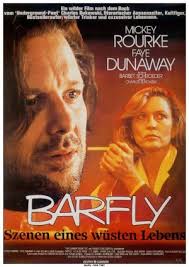
BARFLY
US, 1987, 97 minutes, Colour.
Mickey Rourke, Faye Dunaway, Alice Kruger, Pruitt Taylor Vince, Jack Nance.
Directed by Barbet Schroeder.
Barfly is a very sombre film about alcoholics. It boasts excellent performances by Mickey Rourke and Faye Dunaway, both unglamourised. (However, Mickey Rourke affects a distracting W.C. Fields style of delivery which draws attention to itself.)
The film was written by Charles Bukowski, author of many books and of the film Tales of Ordinary Madness (with Ben Gazzara and Ornella Muti). Bukowski writes of the barflies, bums, prostitutes and the seedier world of the contemporary city - where he feels at home, where he has affection for people.
The film is a portrait of people at a bar, the interactions of their lives, their codes and values, the intrusion of the upper class world and its being out of place.
The film was directed by Barbet Schroeder, director of such films as Maitresse. There is a wide range of musical background, both contemporary and classic.
1. The impact of the film? For what audience?
2. Los Angeles, a world of interiors, bars, alleys, apartments? The contrast with Tully's mansion? Air of realism? Atmosphere of studio sets? The range of the musical score and its commentary?
2. The work of Charles Bukowski, life, art? The poor, alcoholics, suffering - compared with the sufferings of the upper classes? A credible picture of barflies?
3. Themes of alcohol and alcoholism - choices, effects, needs, affinity of alcoholics with one another, outlook, intelligence, sensitivity? A realistic treatment of the question? Sympathetic or not?
4. The audience entering and leaving the Golden Horn bar, beginning with fights, the focus on Henry and the group? What was experienced during this visit? What learnt?
5. The world of the bar: the barkeepers, Jim and his friendliness, support and help for Henry? The relief barkeeper? Eddie and his pugnacious attitudes? The range of the clients: the men eating the sandwiches, the old men and alcoholics - the old man who laughed, the man needing the scarf to steady his shakes, Lily and her cynical remarks? Eddie's girlfriends? The barflies and the raucous and crass prostitutes?
6. Henry -in this world (and the later information about his drinking, prison, tastes, creativity and writing)? The initial fight, his unkempt look, bruised and bloodied, fighting Eddie, bashed and left, people leaving him? His continual reappearances? Jim and his support, morale, drinks, financial? Henry's drinking, his pride? His writing on scraps of poor and creative expression? His apartment, its drabness and ugliness? back to the wrong room and stealing food and drink? His clothes, not changing his underwear? His fighting Eddie and winning? going to the cocktails bar, meeting Wanda? Glad to share experiences with someone who was not ordinary and was mad? The bonds between the two, going home, raiding the corn in the middle of the city, chased by the police? Wanda's tantrum, the casual sexual relationship?, Trying for the job, going to the bar, Eddie taking Wanda home and Henry's angry reaction, throwing her clothes out the window? Wanda's experience of the angel of death, the coming of the ambulance (and its previous visit)?
7. The encounter with Tully, her phone call, arriving, couple next door, Henry's intervention, their anger sadistic sex, the fight with the knife and stabbing the ambulance - again? Driving with Tully, cashing the hooker, going to her mansion, the drinks, talk, his returning to Wanda? The money, drinks for all, Tully, her fight with Wanda, his final fight, going and the film leaving him there? Henry needing this portrait of a drunk, a barfly? A life?
8. Listening to them about their man, calling the cheque, taunting sexual encounter, the arrival fight with Eddie kind of world? Wanda at the cocktail bar, her hating people, liking to drink, liking Henry, not wanting love, going home, loving the corn, chased by the police, escaping into the apartment, hiding, the phone calls to Wilbur and buying things on h-is account, her dependence on him? The green corn and her angry reaction about life? The night, sharing the apartment? Trying to get a job? The contrast with Wanda sober? Trusting the money? Paying the rent? Going to the bar, not promising anything to Henry, going with Eddie? Ringing Henry, the puzzle about the clothes, the vision of the angel of death and her performance as if she had died? Henry's return, the perfume, the money? Her anger and the fight with Tully in the bar? Going on with Henry? Portrait of a life?
9. Tully and the magazine, following Henry, hiring the detective, his taking the photographs of the writing? Her wealth, the magazine, her visit, fascinated by Henry, his way of life and appearance, the stabbed man, going to cash the cheque, going home, her ambitions for his writing, installing him in the guesthouse, drinking and not being used to it, sex, angry with him? His saying that she was imprisoned in a golden cage? Going to the bar, the drink, the fight with Wanda, her leaving -and saying that Henry needs this world?
10. The old prostitute and her enjoyment of her profession, of the fights? Lily and her venomous attitudes? The old men? The old man with the cigarette lighter grateful for helping Wanda? The humane touch in the presentation of the alcoholics?
11. The contrast with the ambulance men and their complaints, the hookers on the street, the police?
12. To what purpose this film? Portrait of people? Insight?
Published in Movie Reviews
Published in
Movie Reviews
Tagged under
Saturday, 18 September 2021 19:27
Blood Ties / Il Cugino Americano
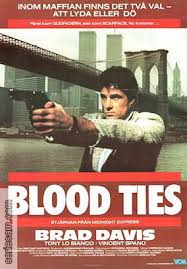
BLOOD TIES (IL CUGINO AMERICANO)
Italy, 125 minutes (miniseries, 240 minutes), Colour.
Brad Davis, Tony Lo Bianco, Vincent Spano, Delia Boccardo, Michael V. Gazzo, Maria Conchita Alonso, Riki Tognazzi.
Directed by Giacomo Battiati.
Blood Ties is an American Italian co-production, especially with Italian television, RAI. With settings in New York and Sicily, the film is another look at the Mafia and its code. (The film is well edited, being pruned from a miniseries.)
Brad Davis is earnest as the young American whose father is held in order to force him to carry out an assassination of his cousin, a judge (Tony Lo Bianco), in Sicily. Needless to say, there are complications - with victory going to those on the side of justice and right. Vincent Spano also stars as a young Sicilian, with an American background, wanting to be a Mafia chief, but full of cocaine and ambition. Nothing particularly new, but quite well done of its kind.
1. Mafia stories on the screen, the long tradition, the aftermath of the Godfather? The portrayal of the Mafia in the U.S., in Sicily?
2. Italian American co-production, the miniseries and the movie edited from this? How effectively? Italian and American locations? The cast? Action and stunt work? The musical score?
3. The title, Mafia codes, family relationships? The bonds between father and son? Within the blood family? Within the Mafia family? Blood ties being used for blackmail?
4. The Sicilian background, audience familiarity with the Mafia families, their violence and codes? Vengeance and assassinations? The role of justice? Judges and their attempts to bring the Mafia to trial? The opening, the chase, the car explosion, the death of the child, the judge escaping attack?
5. In the U.S. Joe, the Sicilian background, his success in the U.S., his pride in his son? The Mafia contacts, taking him, his visiting his son, the son being forced to do the assassination for his father's life? Joe in captivity, the attitude of his captors? The phone calls and the torture? His belief in his son? The escape, his killing himself?
6. Julian, American, the family background, his love for his father, his studies in Korea? The capturing of his father? Going to Sicily, the young mafia chief and the plane trip? The proposal? The pressure of Julian? The gun, the instructions, his being watched? The visit with his cousin, liking him, the pregnant wife, the lawyer? The gun, his plan, talking to the Judge, giving him the gun? Concocting the plan of the kidnap, keeping the Mafia puzzled? On the boat, hiding the judge? The young Mafioso and his believing Julian? The double cross? The capture of the judge's assistants and their torture, the information, the trap? Julian escaping, the help of Duisa (and his romantic attachment to her)? The news of his father's death? The confrontation, the judge helping to shoot the young Mafioso? The reconciliation? Justice and right?
7. The judge, honourable, his pregnant wife and her fears for his life, attacking him for his pride? The confrontation with Julian, the gun, the plan, its execution? The breaking of the plan, the judge captured, interrogated? Rescued? The wife and the inter cutting of her collapse, the birth of the child?
8. The young Mafioso, the American background, cocaine and his dependence on drugs? His swagger and belief in himself? Pressure on Julian? Believing Julian's plan? His tense relationship with his brother, clashes, Don Vincenzo, his relationship with Caterina? The drug taking? The assassination attempt, his vengeance and Caterina killing her father and husband? Overreaching himself, the torture of the judge's assistants, interrogating the judge, his being killed? Don Vincenzo, the power, his son-in-law, the daughter and her betrayal, the drugs? The plan and the assassination attempt? Their being poisoned?
9. The ugly picture of the Mafia, a law unto themselves, wealth, power, violence? Codes? The optimism of this film in the confrontation of the Mafia, their own disintegration, justice prevailing.
Published in Movie Reviews
Published in
Movie Reviews
Tagged under